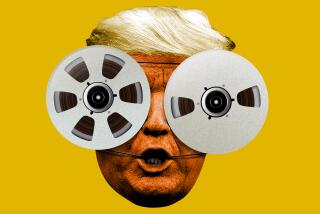A Sound Idea for Those on the Fast Track
- Share via
Some time ago I disturbed a few readers by quoting from a letter I had received from Al Hibbs, one-time voice of the Jet Propulsion Lab, in which he suggested that audio-visual technology would soon replace reading and writing in our schools.
Naturally the letter came in the form of an audiocassette, and before I could study and quote it I had to transcribe it into the visible word--on my computer, of course.
I have now heard from Hibbs again. This time, however, his communication comes as an ordinary typewritten letter, with a signature. I don’t know whether he means to signify that old ways are best, after all, or he is merely trying to keep up his skill on the typewriter. Perhaps it is only that his message this time is so brief he decided not to bother with recording and mailing a cassette.
He says: “Some months ago I sent you a recorded letter on the subject of the need to learn reading and writing. I suggested that in the perhaps near future, television and audio recording would take over the tasks of communication.
“My suggestion included a prediction of a technology that seemed to me a bit visionary, but certainly possible: speed listening, as an analog to speed reading.
“Enclosed is a copy of an advertisement in a mail-order catalogue. It appears that I should be less conservative in predicting the products of this remarkable electronic art.”
The ad describes the GE Fastrac, a portable cassette tape recorder that skips over blank spaces in speech and otherwise alters vocal sounds to produce a playback that takes half the recording time.
“The science of speed listening,” it says. “Now in a portable size.”
The ad includes a picture in which John Moschitta, that little man with the bushy mustache, matching eyebrows and bloodhound eyes who does TV commercials at about twice the normal speed of speech, is shown holding a Fastrac on his desk. Fortunately it is only a still photograph and we don’t have to listen to him.
“Your brain can actually process information 2-3 times faster than most people talk,” the ad says. “That’s why Harvard scientists first developed speed listening technology: to let the brain listen at its full potential.”
Of course the speed recorder can be carried with you wherever you go, and can even be fitted with a power jack for use in your car. A sliding control allows adjustment of playback speed from fast to normal to slow. Slow is for transcribing or for learning a foreign language.
There is no doubt that Fastrac is the embodiment of Hibbs’ vision. The JPL wizard appears, in fact, to have been behind the times with respect to speed listening.
Just as I was not sure I wanted to give up reading and writing for a complete dependency on technology, I am not sure I care to live in a world of speeded-up sound.
When the human voice is speeded up too much the result is not only unintelligible, it sounds like a flock of cackling chickens. We have all encountered this unpleasant phenomenon when we accidentally play a phonograph record at the wrong speed. The female voice especially is rendered unpleasant, rising to a high-pitched screech. (I foresee that husbands and wives might leave messages for each other on a fast-play recorder, with predictable results.)
What woman would like to come home from a hard day at the office only to turn on the home recorder and hear her husband talking at 90 m.p.h., with all those relaxing pauses between words and sentences eliminated:
mothercalledtosayshe’scomingovertospendaweekIburnedtheturkeyhowdoyoucooka- turkey?LoveEd.”
Of course merely running the words together in print doesn’t indicate the disagreeable sound of increased pitch, but it does give you some idea how hard it might be to separate the words in a message played back at super speed.
I can see some uses for the speed recorder. When I was in school I had more than one teacher whose lectures were delivered at such an agonizingly slow pace that it was all I could do to stay awake. I never learned a thing. If I’d had a speed recorder I could have taped those lectures and played them back at a faster speed while I was walking home.
What a different lad I might have turned out to be!
More to Read
The biggest entertainment stories
Get our big stories about Hollywood, film, television, music, arts, culture and more right in your inbox as soon as they publish.
You may occasionally receive promotional content from the Los Angeles Times.










